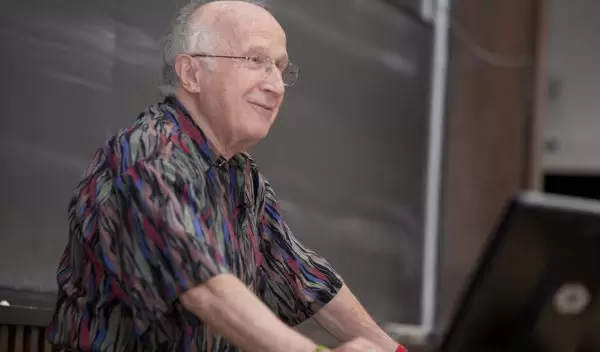
After the Lecture
We sat down with Cornell University's Roald Hoffmann after his recent talk on "The Chemical Imagination at Work in Very Tight Places" as part of the National Science Foundation Distinguished Lectures in Mathematical and Physical Sciences. Our conversation probed the connections between art and science, the qualitative nature of chemistry and how his childhood experiences while hiding from the Nazis during World War II have had an impact on who he is today.
My greatest accomplishment overall has been to remain a reasonably good human being--of taking seriously all the responsibilities we have, educational, scientific, research management and yet have a family and take time for the children. All this in the face of the addictive nature of science and its demands. And, for me, to keep an interest in the humanities.
One way to describe my college career is that I worked up enough courage to tell my parents I didn't want to be a medical doctor, but I didn't have enough courage to tell them I really wanted to be an art historian. I compromised with chemistry.
I love the semi-infinite variety of molecules. I have found chemistry is not reducible to mathematics; it's qualitative in nature and sometimes fuzzy. Primo Levi in his book The Periodic Table has a chapter that begins by him asking, "Where are the theorems of chemistry?" Some things are not very precisely defined, and that bothers some people. I am at home in this very chemical mix of the qualitative and the logical.
I am trying to understand. That is what drives me as a theoretician. I try to understand molecules qualitatively because that's what I think understanding in chemistry is like. Why they have certain shapes, colors, properties--why they act as they do and react in a certain way. So, I find great satisfaction from building frameworks of understanding--quasi-theoretical ways by which I can explain to other people what molecules do. And I am most happy when I can make those explanations as qualitative as possible. So, I'm not afraid to anthropomorphize in the process.
Writing, and imagining the world of emotions in human beings, is fascinating.
Is there something that motivates me? Sometimes I think back to when I took my freshmen English seminar at Columbia; on my first paper I got a "C." It said, "purple prose" all over it. I was using my best high school style, but this excellent teacher, whose purpose was to teach me to write simply and directly, perceived it correctly. I deserved a "C." I recovered, but I'm still trying to write that "A" paper for that teacher. There a hint here of my psychology, to try to please. To do so is a goad to creation that communicates--both scientific and otherwise.
My tendency to please might result from my childhood experiences in wartime Poland. I'm always looking for compromise or explanations to negative things. I get into trouble occasionally because I compromise too much.
I was a quiet child. I had to be quiet. What I could see, hiding in that attic of a schoolhouse in Galicia, was the children playing outside. Psychologically, I'm still afraid of people in uniform, even if I know they're harmless--even a doorman at an apartment house.
Everything goes back to college at Columbia.
I was inspired by a poetry course in college, but I didn't start to write until age 40. I remember from that course, taught by Mark Van Doren, the poem that really turned me on. Wallace Stevens Sunday Morning. The way the woman talks about the smell of oranges. That was just wonderful.
Most important to me were two poets: Wallace Stevens and Archie Ammons. A.R. Ammons, who had an interest in science, was my guru and a friend too.
Scientists have interesting stories to tell.
Research and teaching are very closely involved. There's just a difference in audience. To me, there is the task of convincing or teaching my colleagues of a certain world view through writing a scientific paper. It has many similarities with teaching first-year chemistry.
I have no control over who reads my papers. I do have control over what comes out of my mouth, but I don't know how it is received by the students. Some of them know. Some of them don't know. Some of them are asleep. I'm talking to all of them at the same time. I would like to reach them. I really care that they learn.
I think using colloquial language as much as possible is important--trying in a written paper to get the closest you can to the language of speaking. It helps in explaining complexity. It helps establish emotional contact with your audience. In front of a class, I can show students this is a human being standing in front of them, and that I care that they learn, without condemning them if they don't learn. But how does one do that in a paper--to induce a bit of an emotional tie? If you say, "this is something we did not understand," there's a little admission of weakness instead of an omniscient narrator. I would be in favor of that, or if you could sneak in a few descriptive words, ones with emotional resonances, here and there.
Science is somehow inherently cool. The lack of emotion that makes it objective science also makes it harder to reach people. And no amount of screaming that you are doing something important is going to help this. And to me, that's the important reason for trying for outreach and talking to people.
I just go on to do the next interesting thing. But then what is it that defines "interesting?"
